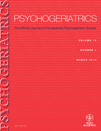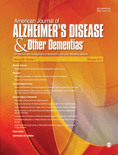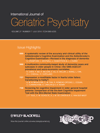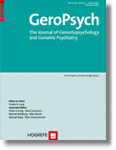
Psychogeriatrics
Scope & Guideline
Advancing mental health insights for the aging population.
Introduction
Aims and Scopes
- Mental Health and Psychological Disorders in Older Adults:
The journal emphasizes research on various mental health conditions prevalent among older adults, including depression, anxiety, and cognitive disorders. It seeks to share innovative therapeutic approaches and interventions tailored to this demographic. - Cognitive Function and Impairment:
Research on cognitive decline, including studies on dementia, mild cognitive impairment, and associated psychological symptoms are central themes. The journal offers insights into the mechanisms of cognitive impairment and strategies for enhancement and management. - Social and Environmental Influences on Elderly Health:
The impact of social factors, such as isolation, support systems, and caregiving dynamics, is explored. The journal encourages studies that relate social determinants to mental health outcomes in older populations. - Interventions and Therapeutic Approaches:
A focus on non-pharmacological interventions, therapeutic practices, and holistic approaches to improve the well-being of older adults. The journal showcases evidence-based practices that enhance the quality of life in geriatric care. - Cultural and Societal Perspectives on Aging:
The journal includes research that examines how cultural differences influence perceptions and treatment of mental health issues in older adults, contributing to a broader understanding of geriatric care across diverse populations.
Trending and Emerging
- Impact of COVID-19 on Mental Health:
Research focusing on the psychological effects of the COVID-19 pandemic on older adults has surged. This includes studies on increased anxiety, depression, and cognitive decline associated with pandemic-related isolation and stress. - Digital Health and Telehealth Interventions:
There is a growing interest in the use of technology, including telehealth and digital interventions, to enhance mental health care for older adults. This trend reflects the need for accessible mental health services in the face of mobility challenges. - Cognitive Frailty and Its Implications:
Emerging studies on cognitive frailty—combining physical frailty and cognitive impairment—are gaining traction. This theme addresses the complex interplay between physical and cognitive health, emphasizing integrated care approaches. - Social Isolation and Loneliness:
Research on the effects of social isolation and loneliness on mental health is on the rise. The journal is increasingly publishing studies that explore interventions to mitigate these issues, recognizing their significant impact on overall well-being. - Non-Pharmacological Interventions:
There is a notable trend towards exploring non-pharmacological interventions, such as mindfulness, reminiscence therapy, and community-based programs, as effective strategies for improving mental health outcomes in older adults.
Declining or Waning
- Pharmacological Treatments for Cognitive Disorders:
There has been a noticeable shift away from traditional pharmacological studies towards more holistic, non-pharmacological interventions. While pharmacotherapy remains important, the emphasis in recent research has moved towards behavioral therapies and lifestyle interventions. - Physical Health Issues in Isolation from Mental Health:
Research that treats physical health issues separately from mental health concerns is becoming less common. There is a growing recognition of the interconnectedness of physical and mental health, prompting a more integrated approach. - Elderly Abuse and Neglect Studies:
The focus on elder abuse specifically as a standalone topic seems to be waning, as the discourse is increasingly integrated into broader mental health and caregiver burden studies rather than being treated as an isolated issue.
Similar Journals

American Journal of Alzheimers Disease and Other Dementias
Innovating solutions for neurodegenerative challenges.The American Journal of Alzheimer's Disease and Other Dementias, published by SAGE Publications Inc, is a pivotal resource for researchers, clinicians, and students engaged in the study of neurodegenerative diseases, particularly Alzheimer’s disease and various forms of dementia. With an impact factor reflecting its significance in the field, the journal boasts an open-access format since 2020, ensuring that groundbreaking research is accessible to a global audience. The journal holds prestigious Q2 rankings across several categories, including Clinical Psychology, Geriatrics and Gerontology, Neuroscience, and Psychiatry and Mental Health. Covering a wide spectrum from 1986 to 2024, it provides essential insights into innovative treatments, care strategies, and the latest findings in dementia research, solidifying its importance in fostering knowledge and advancing the field. With a commitment to high-quality scholarship, this journal is an indispensable tool for advancing understanding in the dynamic landscape of dementia studies.

JOURNAL OF AGING AND HEALTH
Exploring the intersection of gerontology and well-being.The JOURNAL OF AGING AND HEALTH, published by SAGE PUBLICATIONS INC, is a preeminent peer-reviewed journal dedicated to advancing research in the field of gerontology and related disciplines. With an impressive impact factor and ranked Q1 across multiple categories including Community and Home Care, Geriatrics and Gerontology, and Health (Social Science), this journal has established itself as a vital resource for academics, clinicians, and policymakers alike. Spanning over three decades of publication from 1989 to 2024, it serves as a platform for innovative research and multifaceted discussions on aging, health, and the interplay of social factors influencing the elderly population. The journal's rigorous standards for publication ensure high-quality contributions that are impactful and relevant, making it an essential read for those dedicated to improving the health and quality of life for older adults. Although it is not an open-access journal, it provides comprehensive insights that are critical to understanding the complexities of aging in today's society.

Aging Medicine and Healthcare
Unlocking the Secrets of Healthy AgingAging Medicine and Healthcare is a leading Open Access journal dedicated to advancing the understanding of geriatric health and the complexities of aging. Published by the Asia Pacific League Clinical Gerontology & Geriatrics, this innovative journal began its journey in 2019 and has since established itself as an important resource for healthcare professionals, researchers, and students interested in the fields of geriatrics and gerontology. With an impact factor that reflects its growing significance (ranked in the 21st percentile within its category), the journal aims to disseminate high-quality research and practical insights that can inform clinical practice and enhance patient care for aging populations. As an Open Access publication, it ensures that research findings are freely accessible, fostering collaboration and knowledge sharing among academics and practitioners globally. The journal is poised to be a vital platform for innovative studies, systematic reviews, and case reports that illuminate the challenges and opportunities in aging medicine.

AMERICAN JOURNAL OF GERIATRIC PSYCHIATRY
Advancing Knowledge: Transforming Mental Health for Older AdultsAmerican Journal of Geriatric Psychiatry, published by Elsevier Science Inc, stands as a leading journal in the fields of geriatrics and gerontology, as well as psychiatry and mental health, recognized with a Q1 ranking in both categories for 2023. With a robust ISSN of 1064-7481 and E-ISSN 1545-7214, this journal has been a vital resource since its inception in 1993, contributing to the academic discourse surrounding the mental health of older adults. The journal focuses on publishing high-quality research and reviews that address the complexities of psychiatric disorders in geriatric populations, making it essential reading for researchers, professionals, and students dedicated to enhancing the mental well-being of elderly individuals. Notably, it achieves impressive Scopus rankings, sitting at the 5th percentile in Geriatrics and Gerontology and 24th percentile in Psychiatry and Mental Health, underscoring its impact and relevance in the academic community. While it does not offer open access, the journal's comprehensive content is vital for those looking to stay informed on the latest advancements in geriatric psychiatry. For more information, readers can access it via Elsevier's educational platforms.

INTERNATIONAL JOURNAL OF GERIATRIC PSYCHIATRY
Pioneering research at the intersection of aging and psychiatry.International Journal of Geriatric Psychiatry, published by Wiley, stands as a premier journal dedicated to advancing the field of mental health in older adults. With an impressive impact factor reflective of its Q1 categorization in both Geriatrics and Gerontology, as well as Psychiatry and Mental Health, this journal addresses the critical intersection of aging and mental health, providing a platform for impactful research from 1986 through 2024. Researchers and professionals will find the journal invaluable, as it offers comprehensive insights into a range of subjects pertinent to geriatric mental health, with its ranking in Scopus highlighting its academic rigor and relevance (Rank #147/567 in Psychiatry and Mental Health; Rank #37/116 in Geriatrics and Gerontology). Though it operates on a traditional subscription model, the journal's significant contributions to the understanding of psychiatric disorders in the elderly make it a key resource for anyone involved in geriatric care and research.

INTERNATIONAL PSYCHOGERIATRICS
Connecting Research and Practice in PsychogeriatricsINTERNATIONAL PSYCHOGERIATRICS, published by Cambridge University Press, stands as a premier journal in the realm of Psychology, Geriatrics, and Gerontology. Established in 1989 and continuing through 2024, this journal holds a distinguished position, evidenced by its 2023 quartile rankings of Q1 in Clinical Psychology, Geriatrics, and Gerontology, and Q2 in Psychiatry and Mental Health. With an impressive Scopus ranking—19th in Clinical Psychology and 3rd in Gerontology—the journal is dedicated to advancing the understanding of mental health in older adults, making it a crucial resource for researchers, healthcare professionals, and students alike. Although it does not offer open access, the journal ensures a broad dissemination of knowledge through subscriptions while maintaining high academic standards and rigor. With a focus on critical research articles, reviews, and clinical studies, INTERNATIONAL PSYCHOGERIATRICS continues to shape the dialogue around the complex interplay of aging and mental health.

Gerontology and Geriatric Medicine
Innovating geriatric medicine through open access insights.Gerontology and Geriatric Medicine is a distinguished journal published by SAGE Publications Inc, focusing on the vital field of gerontology and geriatrics. With an impressive Q2 ranking in Geriatrics and Gerontology as of 2023, this journal serves as a crucial platform for disseminating high-quality research and innovation related to aging and elderly care. Since embracing an Open Access model in 2015, it has broadened its reach, enabling scholars, researchers, and practitioners worldwide to access valuable insights without barriers. The journal’s scope encompasses a variety of interdisciplinary studies that address the multifaceted aspects of geriatric medicine, making it an essential resource for anyone dedicated to advancing knowledge and practices in this critical domain. With its commitment to enhancing the understanding of aging populations, Gerontology and Geriatric Medicine is poised to contribute significantly to the ongoing discourse and research developments in the care for older adults.

GERONTOLOGIST
Connecting Scholars to Enhance Aging ResearchThe GERONTOLOGIST, published by Oxford University Press Inc, is a premier journal in the field of geriatrics and gerontology, with a distinguished history since its inception in 1961. This esteemed journal stands out with its impressive Q1 rankings in prominent categories, including Geriatrics and Gerontology, reflecting its vital role in disseminating innovative research and advancing knowledge within these critical disciplines. With an impact factor that ranks it among the top journals in both Nursing Gerontology and Medicine, the GERONTOLOGIST serves as a key resource for researchers, professionals, and students dedicated to enhancing the health and well-being of older adults. Although it operates under a traditional access model, the journal remains committed to publishing cutting-edge studies that address the complexities of aging and inform evidence-based practices. By fostering a rich dialogue among scholars and practitioners, the GERONTOLOGIST is instrumental in shaping the future of gerontological research and policy.

Journal of Aging Research
Exploring the intricacies of geriatric health.The Journal of Aging Research, an esteemed publication under the auspices of HINDAWI LTD, has been a cornerstone for the dissemination of research in the field of aging since its inception in 2010. With an impact factor reflective of its significance in the discipline, this journal is categorized in the 3rd quartile (Q3) for Geriatrics and Gerontology, and ranks 43rd out of 116 in its field according to Scopus rankings, positioning it in the 63rd percentile for quality research. The journal operates with a fully Open Access model, ensuring that all published articles are freely available to researchers, practitioners, and the broader public, expanding the reach and impact of scholarly work. Set to converge from 2010 to 2024, the journal is dedicated to advancing the understanding of the aging process through rigorous research, comprehensive reviews, and innovative insights, making it an invaluable resource for anyone involved in the study or practice of geriatric health care and related disciplines.

GeroPsych-The Journal of Gerontopsychology and Geriatric Psychiatry
Empowering Research for a Healthier Aging PopulationGeroPsych - The Journal of Gerontopsychology and Geriatric Psychiatry, published by HOGREFE AG, stands as an essential academic resource in the evolving fields of gerontology and geriatric psychiatry. With a commitment to advancing the understanding of psychological well-being in older adults, the journal provides a platform for high-quality research, discussion, and innovation that caters to researchers, practitioners, and students alike. Although currently not an open-access publication, GeroPsych ensures accessibility through various academic libraries and institutions, fostering a collaborative approach to the complexities of aging and mental health. Recognized within the Q3 category for Geriatrics and Gerontology, and with its impact reflected in Scopus rankings, this journal plays a pivotal role in informing best practices and shaping policies within the interdisciplinary landscape of geriatric care. Spanning research from 2010 to 2024, GeroPsych is positioned as a leading journal for those committed to improving the mental health and psychological resilience of the aging population.